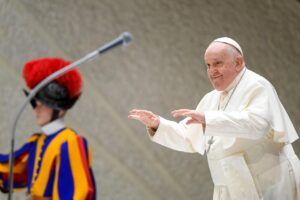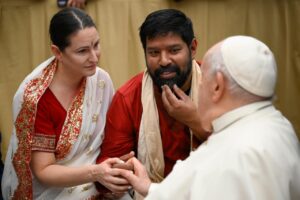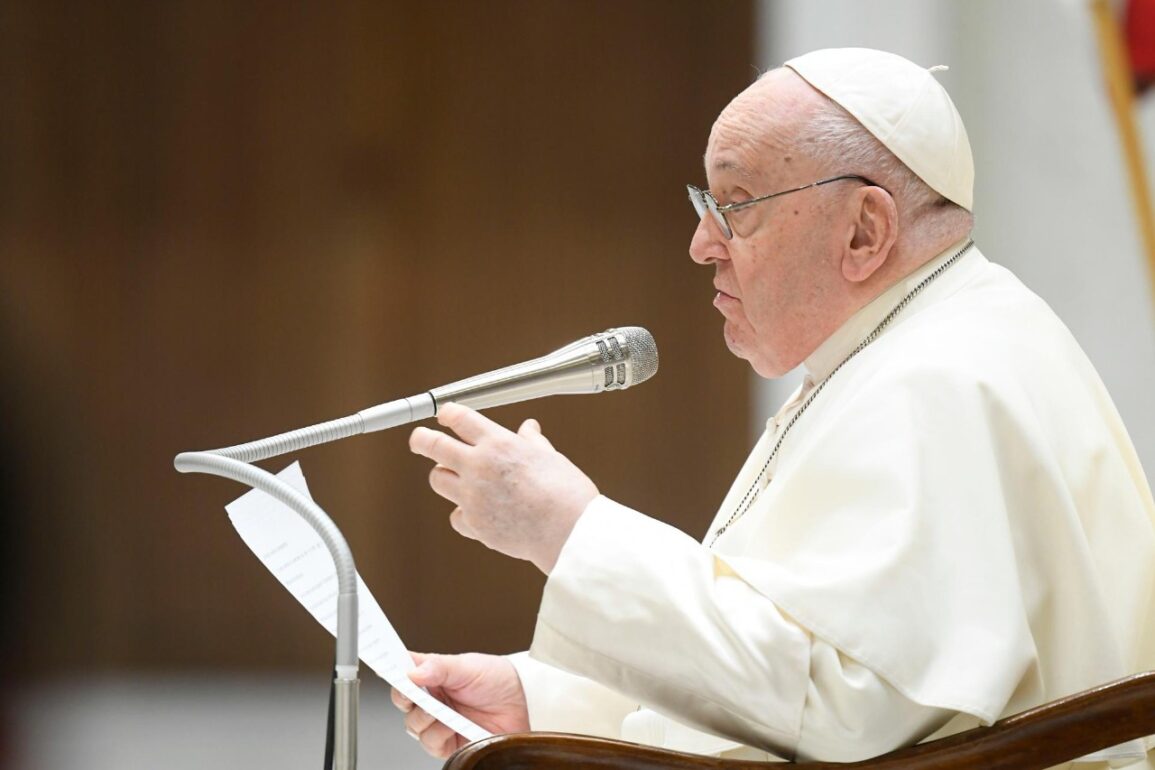The general audience this Wednesday, January 10, 2024, was held at 9:00 a.m. in the Paul VI Hall, where the Holy Father Francis met with groups of pilgrims and faithful from Italy and around the world.
In his speech in Italian, the Pope, continuing the new cycle of catechesis on “The Vices and the Virtues”, focused his reflection on the topic of Gluttony (Reading: Mt 2. 23-26).
After summarizing his catechesis in the different languages, the Holy Father addressed special expressions of greeting to the faithful present.
The General Audience concluded with the prayer of the Pater Noster and the Apostolic Blessing.
Below is the full text of the Pope’s catechesis for the general audience.
***
The following text includes parts that were not read out loud, but should be considered as such:
Cycle of Catechesis. Vices and Virtues. 3. Gluttony
Dear brothers and sisters, good morning!
In our journey of catechesis, in this path of catechesis we are doing, on vices and virtues, today we will take a look at the vice of gluttony. Gluttony.

But there is even more. Although Jesus’ attitude towards the Jewish precepts reveals His full submission to the Law, He nonetheless shows Himself to be sympathetic towards His disciples: when they are found wanting, because they pluck grain out of hunger, He justifies them, recalling that even King David and his companions took the sacred bread (cf. Mk 2:23-26). And Jesus affirms a new principle: the wedding guests cannot fast when the bridegroom is with them. Jesus wants us to be joyful in His company – He is like the bridegroom of the Church; but He also wants us to participate in His sufferings, which are also the sufferings of the small and the poor. Jesus is universal.

They are illnesses, often extremely painful, that are mostly linked to sufferings of the psyche and the soul. There is a connection between psychological imbalance and the way food is consumed. The way we eat is the manifestation of something inner: a predisposition to balance or immoderation; the capacity to give thanks or the arrogant presumption of autonomy; the empathy of those who share food with the needy, or the selfishness of those who hoard everything for themselves. This question is so important. Tell me how you eat, and I will tell you what kind of soul you possess. In the way we eat, we reveal our inner selves, our habits, our psychological attitudes.

If we interpret it from a social point of view, gluttony is perhaps the most dangerous vice, which is killing the planet. Because the sin of those who succumb before a piece of cake, all things considered, does not cause great damage, but the voracity with which we have been plundering the goods of the planet for some centuries now is compromising the future of all. We have grabbed everything, in order to become the masters of all things, whereas everything had been consigned to our custody, not for us to exploit. Here, then, is the great sin, the fury of the belly is a great sin: we have abjured the name of men, to assume another, “consumers”. Today we speak like this in social life, consumers. We did not even notice when someone had started to give us this name. We were made in order to be “Eucharistic” men and women, capable of giving thanks, discreet in the use of the land, and instead the danger is that we turn into predators; and now we are realizing that this form of “gluttony” has done a great deal of harm to the world. Let us ask the Lord to help us on the road to sobriety, so that the many forms of gluttony do not take over our life. Thank you.
_________________________________________
Special Greetings
I greet all the English-speaking pilgrims and visitors taking part in today’s Audience, especially those coming from Korea and the United States of America.
I also welcome the priests from the Institute for Continuing Theological Education at the Pontifical North American College. Upon all of you, and upon your families, I invoke the joy and peace of Our Lord Jesus Christ. God bless you!
______________________
Summary of the Holy Father’s words
Dear brothers and sisters: in our continuing catechesis on the vices and the virtues, we now consider the sin of gluttony. As a guest at the wedding feast of Cana, Jesus taught the goodness of food and drink, and the joy of table fellowship. Rejecting the ritual distinction between pure and impure foods, the Lord turns our attention to our personal relationship with the consumption of food. In societies troubled by eating disorders and which, all too often, waste great amounts of food even as many people in our world go hungry, our eating habits should be moderate and socially responsible. May the prayers we say in thanksgiving for God’s gift of our daily bread, inspire us to be mindful of our responsibility towards others and virtuous in our enjoyment of the good things of this earth.










